How Long Before You Know if You Have Food Poison
Do we really alive longer than our ancestors?
(Image credit:
BBC/Getty
)
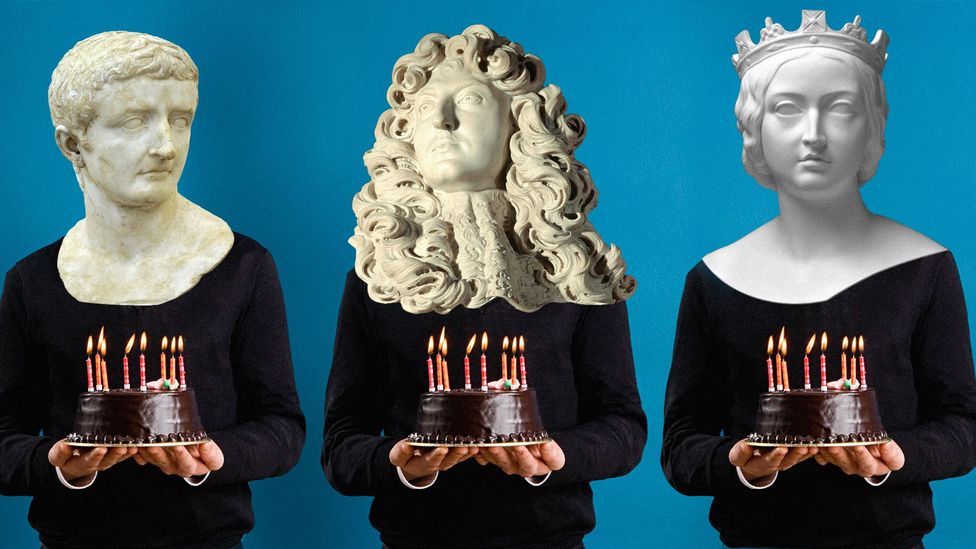
The wonders of modern medicine and diet make information technology easy to believe we enjoy longer lives than at any time in human history, but we may non exist that special afterwards all.
O
Over the last few decades, life expectancy has increased dramatically around the earth. The average person built-in in 1960, the earliest twelvemonth the United Nations began keeping global data, could look to live to 52.v years of age. Today, the boilerplate is 72. In the UK, where records have been kept longer, this trend is even greater. In 1841, a babe girl was expected to live to just 42 years of historic period, a boy to 40. In 2016, a babe girl could expect to attain 83; a male child, 79.
The natural decision is that both the miracles of modernistic medicine and public health initiatives have helped us live longer than always before – so much and so that we may, in fact, be running out of innovations to extend life further. In September 2018, the Role for National Statistics confirmed that, in the Great britain at least, life expectancy has stopped increasing. Across the U.k., these gains are slowing worldwide.
This belief that our species may take reached the peak of longevity is also reinforced by some myths about our ancestors: it'due south common belief that ancient Greeks or Romans would have been flabbergasted to meet anyone above the age of 50 or 60, for example.
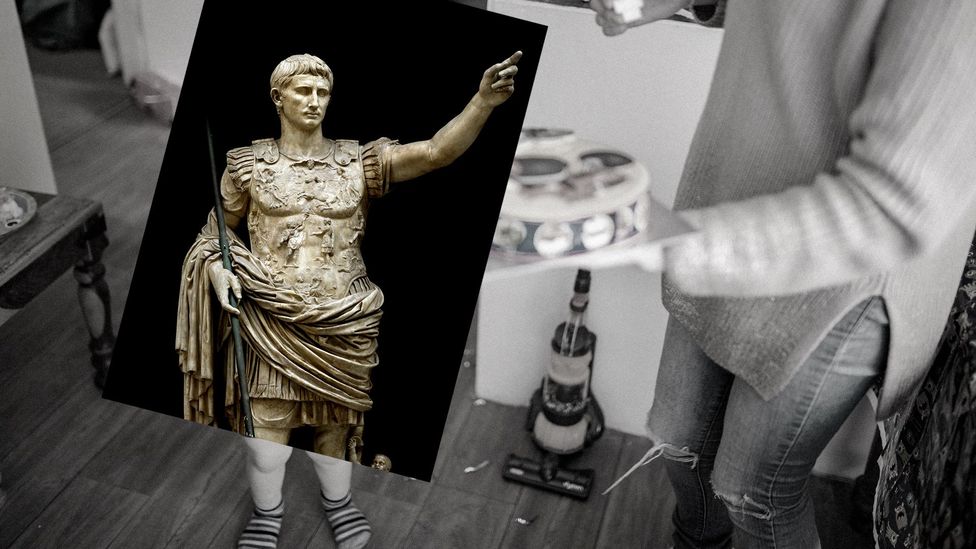
Rome's kickoff emperor, Augustus, died at 75 – underscoring the stardom between our ancestors' boilerplate life expectancy versus their life span (Credit: BBC/Getty)
"There is a basic distinction between life expectancy and life span," says Stanford Academy historian Walter Scheidel, a leading scholar of ancient Roman demography. "The life span of humans – opposed to life expectancy, which is a statistical construct – hasn't really changed much at all, as far as I can tell."
Life expectancy is an average. If you have two children, and i dies before their offset birthday but the other lives to the age of 70, their average life expectancy is 35.
That'due south mathematically correct – and it certainly tells us something nearly the circumstances in which the children were raised. But information technology doesn't give the states the full picture. It also becomes specially problematic when looking at eras, or in regions, where there are high levels of baby bloodshed. Most of human history has been blighted by poor survival rates among children, and that continues in diverse countries today.
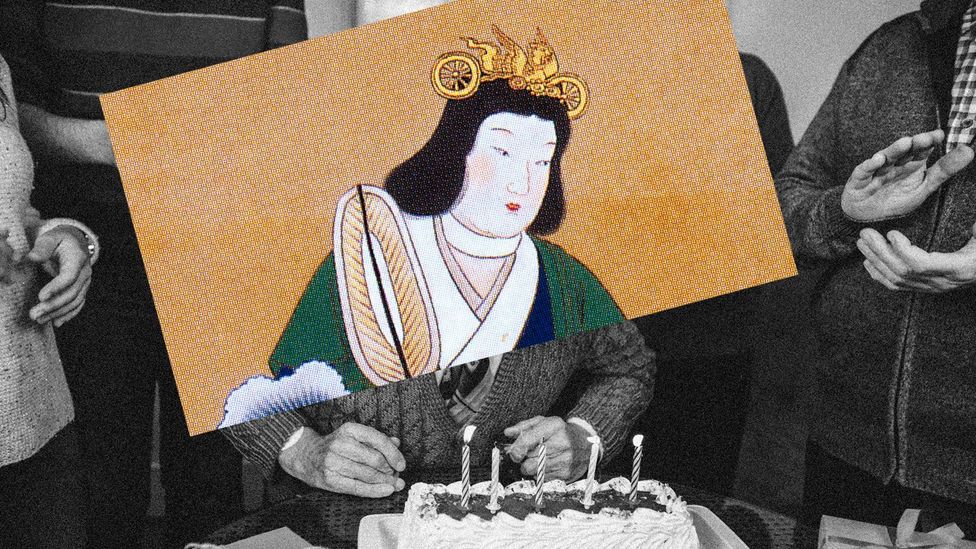
The 6th-Century ruler Empress Suiko, who was Nippon'due south first reigning empress in recorded history, died at 74 years of age (Credit: BBC/Getty)
This averaging-out, however, is why it's normally said that ancient Greeks and Romans, for example, lived to just xxx or 35. But was that really the instance for people who survived the fragile menstruation of babyhood, and did it mean that a 35-year-erstwhile was truly considered 'quondam'?
If one's thirties were a decrepit one-time historic period, ancient writers and politicians don't seem to take got the message. In the early 7th Century BC, the Greek poet Hesiod wrote that a human being should marry "when y'all are not much less than 30, and not much more". Meanwhile, aboriginal Rome's 'cursus honorum' – the sequence of political offices that an ambitious young man would undertake – didn't even allow a fellow to stand for his first office, that of quaestor, until the age of 30 (nether Emperor Augustus, this was later lowered to 25; Augustus himself died at 75). To be consul, you had to exist 43 – 8 years older than the US'southward minimum age limit of 35 to hold a presidency.
In the 1st Century, Pliny devoted an entire chapter of The Natural History to people who lived longest. Amidst them he lists the delegate Chiliad Valerius Corvinos (100 years), Cicero's married woman Terentia (103), a woman named Clodia (115 – and who had 15 children along the manner), and the extra Lucceia who performed on phase at 100 years old.
Then there are tombstone inscriptions and grave epigrams, such as this one for a woman who died in Alexandria in the 3rd Century BC. "She was lxxx years former, simply able to weave a frail weft with the shrill shuttle", the epigram reads admiringly.
Not, however, that ageing was any easier then than it is now. "Nature has, in reality, bestowed no greater blessing on human being than the shortness of life," Pliny remarks. "The senses become dull, the limbs torpid, the sight, the hearing, the legs, the teeth, and the organs of digestion, all of them die before u.s.…" He can think of only one person, a musician who lived to 105, who had a pleasantly healthy old age. (Pliny himself reached barely half that; he'due south idea to have died from volcanic gases during the eruption of Mt Vesuvius, anile 56).
In the aboriginal world, at to the lowest degree, information technology seems people certainly were able to live simply as long every bit nosotros do today. But just how mutual was it?
Historic period of empires
Dorsum in 1994 a written report looked at every homo entered into the Oxford Classical Dictionary who lived in aboriginal Greece or Rome. Their ages of expiry were compared to men listed in the more recent Chambers Biographical Dictionary.
Of 397 ancients in full, 99 died violently by murder, suicide or in battle. Of the remaining 298, those born earlier 100BC lived to a median age of 72 years. Those born afterward 100BC lived to a median age of 66. (The authors speculate that the prevalence of unsafe lead plumbing may accept led to this credible shortening of life).
The median of those who died betwixt 1850 and 1949? 70-ane years old – just one year less than their pre-100BC cohort.
Of course, there were some obvious problems with this sample. I is that it was men-only. Another is that all of the men were illustrious enough to be remembered. All nosotros can actually accept abroad from this is that privileged, accomplished men have, on average, lived to virtually the same age throughout history – every bit long equally they weren't killed first, that is.
All the same, says Scheidel, that'south non to be dismissed. "It implies there must have been non-famous people, who were much more numerous, who lived fifty-fifty longer," he says.
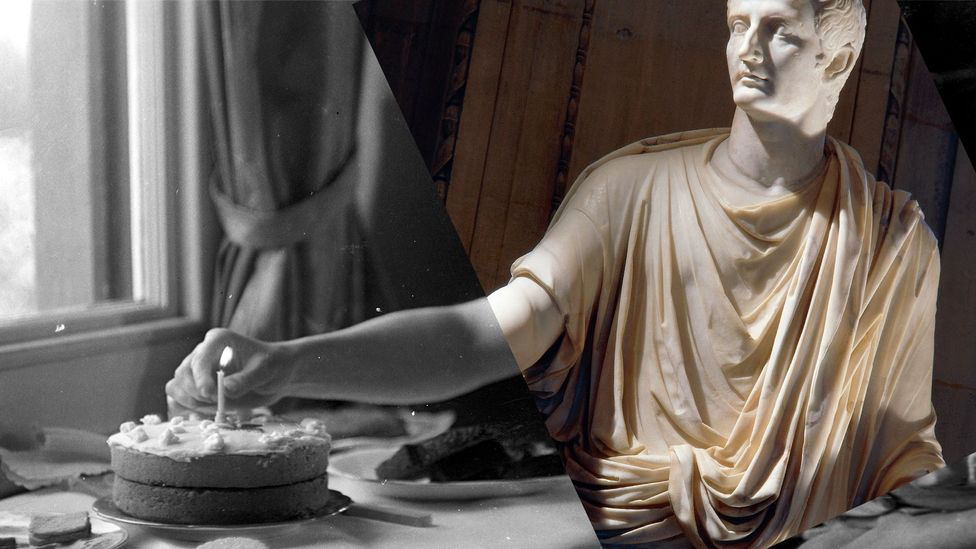
The Roman emperor Tiberius died at the age of 77 – some accounts say by murder (Credit: BBC/Getty)
Not everyone agrees. "In that location was an enormous difference betwixt the lifestyle of a poor versus an elite Roman," says Valentina Gazzaniga, a medical historian at Rome'due south La Sapienza University. "The weather condition of life, access to medical therapies, even just hygiene – these were all certainly improve among the elites."
In 2016, Gazzaniga published her research on more than ii,000 ancient Roman skeletons, all working-form people who were cached in mutual graves. The average historic period of death was 30, and that wasn't a mere statistical quirk: a loftier number of the skeletons were effectually that age. Many showed the effects of trauma from hard labour, besides as diseases we would acquaintance with later ages, like arthritis.
Men might have borne numerous injuries from manual labour or military service. But women – who, it's worth noting, also did hard labour such as working in the fields – hardly got off piece of cake. Throughout history, childbirth, often in poor hygienic conditions, is simply ane reason why women were at particular take chances during their fertile years. Fifty-fifty pregnancy itself was a danger.
"We know, for example, that beingness pregnant adversely affects your immune system, because y'all've basically got another person growing inside you," says Jane Humphries, a historian at the University of Oxford. "Then y'all tend to exist susceptible to other diseases. So, for example, tuberculosis interacts with pregnancy in a very threatening way. And tuberculosis was a affliction that had higher female person than male bloodshed."
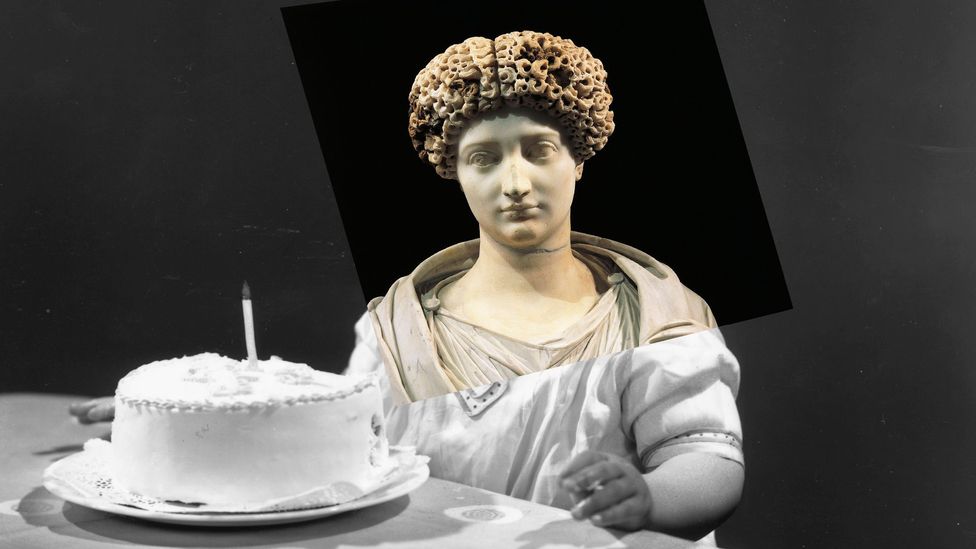
The Roman noble Julia the Elder died in the year xiv at the age of 54, just most sources concur her decease was the untimely outcome of exile and imprisonment (Credit: BBC/Getty)
Childbirth was worsened past other factors also. "Women often were fed less than men," Gazzaniga says. That malnutrition means that immature girls often had incomplete development of pelvic bones, which then increased the risk of difficult child labour.
"The life expectancy of Roman women really increased with the decline of fertility," Gazzaniga says. "The more than fertile the population is, the lower the female life expectancy."
Missing people
The difficulty in knowing for sure just how long our average predecessor lived, whether ancient or pre-historic, is the lack of information. When trying to decide average ages of death for ancient Romans, for case, anthropologists frequently rely on census returns from Roman Egypt. But because these papyri were used to collect taxes, they ofttimes under-reported men – as well every bit left out many babies and women.
Tombstone inscriptions, left behind in their thousands by the Romans, are another obvious source. Merely infants were rarely placed in tombs, poor people couldn't afford them and families who died simultaneously, such as during an epidemic, too were left out.
And even if that weren't the case, there is another trouble with relying on inscriptions.
"You need to live in a world where you have a certain amount of documentation where information technology tin can even be possible to tell if someone lived to 105 or 110, and that only started quite recently," Scheidel points out. "If someone actually lived to be 111, that person might not take known."
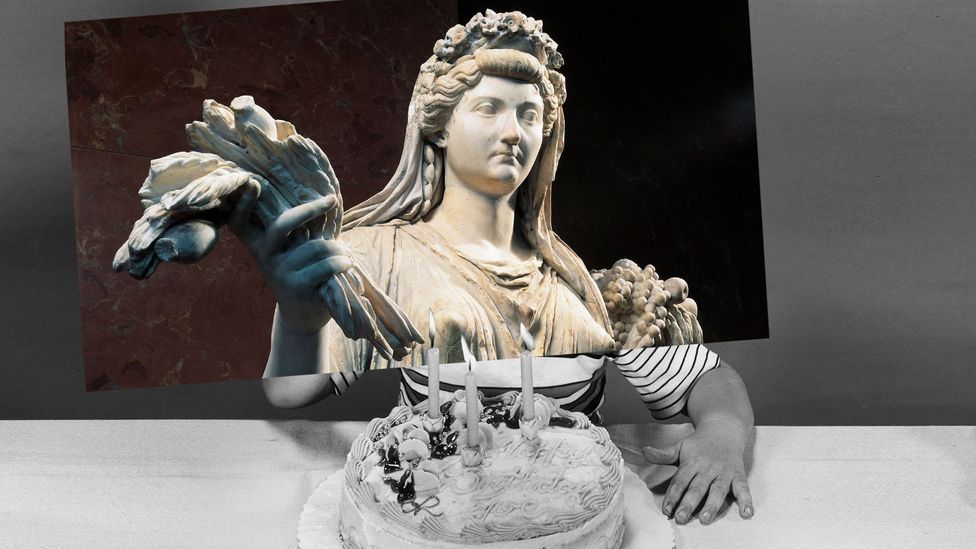
The Roman empress Livia, wife of Augustus, lived until she was 86 or 87 years former (Credit: BBC/Getty)
As a result, much of what we think we know about ancient Rome'south statistical life expectancy comes from life expectancies in comparable societies. Those tell united states of america that every bit many as one-tertiary of infants died earlier the historic period of one, and one-half of children before historic period x. After that historic period your chances got significantly better. If yous made it to sixty, you'd probably live to be 70.
Taken altogether, life span in ancient Rome probably wasn't much different from today. It may have been slightly less "because you lot don't have this invasive medicine at end of life that prolongs life a little scrap, but not dramatically different", Scheidel says. "You lot can take extremely low average life expectancy, considering of, say, meaning women, and children who die, and notwithstanding have people to live to 80 and 90 at the same time. They are only less numerous at the end of the day because all of this compunction kicks in."
Of course, that compunction is not to be sniffed at. Particularly if yous were an infant, a adult female of childbearing years or a hard labourer, yous'd be far amend off choosing to live in yr 2018 than 18. But that still doesn't mean our life span is actually getting significantly longer as a species.
On the tape
The data gets amend later in homo history once governments brainstorm to keep careful records of births, marriages and deaths – at first, particularly of nobles.
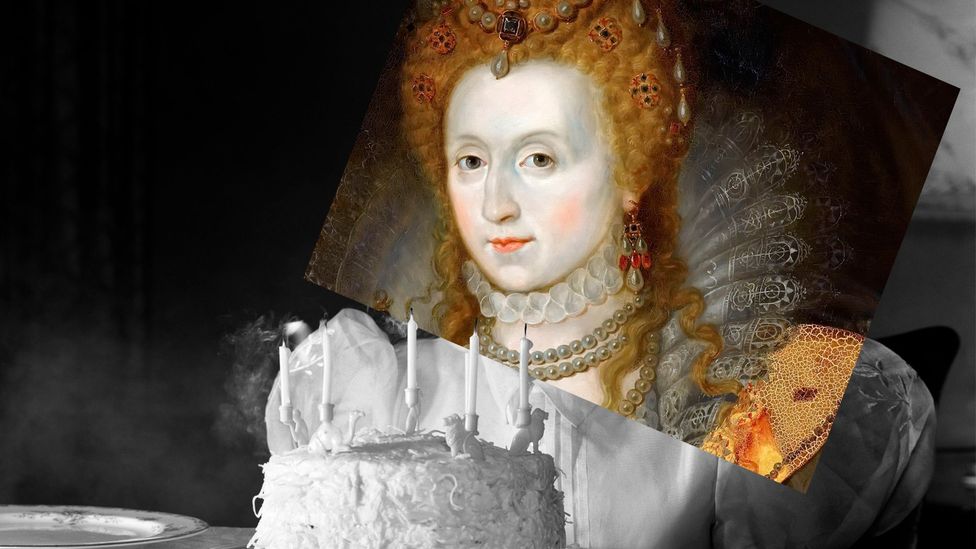
Queen Elizabeth I lived until the age of lxx; life expectancy at the time could be longer for villagers than for royals (Credit: BBC/Getty)
Surely, by the soot-ridden era of Charles Dickens, life was unhealthy and short for nearly everyone? Still no. As researchers Judith Rowbotham, now at the University of Plymouth, and Paul Clayton, of Oxford Brookes Academy, write, "one time the dangerous childhood years were passed… life expectancy in the mid-Victorian catamenia was not markedly unlike from what it is today". A five-year-old daughter would live to 73; a boy, to 75.
Not just are these numbers comparable to our ain, they may exist even better. Members of today'due south working-course (a more authentic comparison) live to effectually 72 years for men and 76 years for women.
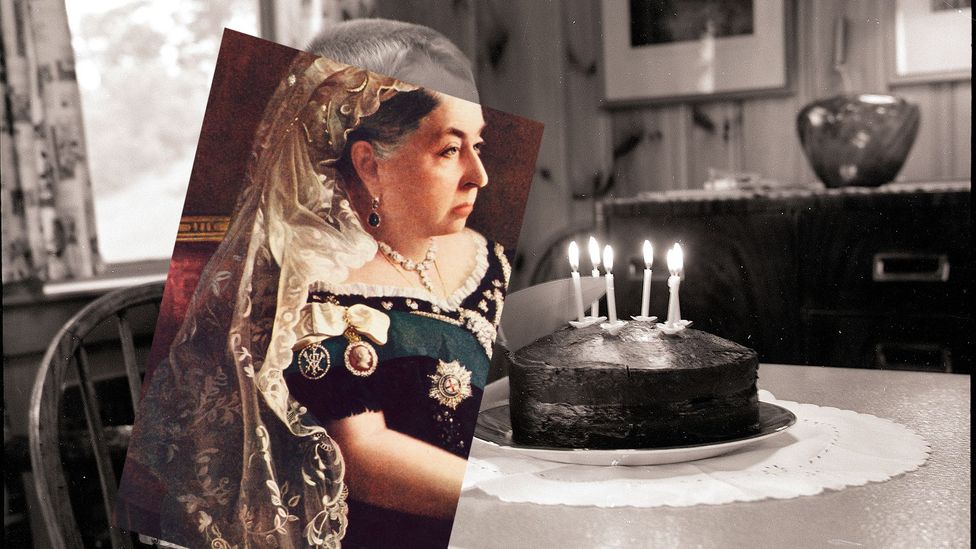
Britain'south Queen Victoria died in 1901 at the age of 81. During her reign, a girl could expect to live to nearly 73 years of historic period, a boy to 75 (Credit: BBC/Getty)
"This relative lack of progress is striking, especially given the many environmental disadvantages during the mid-Victorian era and the land of medical care in an historic period when modern drugs, screening systems and surgical techniques were self-patently unavailable," Rowbotham and Clayton write.
They argue that if we retrieve we're living longer than ever today, this is because our records become back to around 1900 – which they call a "misleading baseline", as it was at a time when nutrition had decreased and when many men started to smoke.
Pre-historic people
What most if nosotros look in the other direction in time – before whatsoever records at all were kept?
Although it is manifestly difficult to collect this kind of information, anthropologists have tried to substitute past looking at today's hunter-gatherer groups, such equally the Ache of Paraguay and Hadza of Tanzania. They constitute that while the probability of a newborn'due south survival to historic period 15 ranged between 55% for a Hadza boy up to 71% for an Anguish boy, in one case someone survived to that point, they could expect to live until they were betwixt 51 and 58 years old. Data from modern-day foragers, who have no admission to medicine or modern nutrient, write Michael Gurven and Cristina Gomes, finds that "while at birth mean life expectancies range from xxx to 37 years of life, women who survive to age 45 tin await to live an additional twenty to 22 years" – in other words, from 65 to 67 years old.
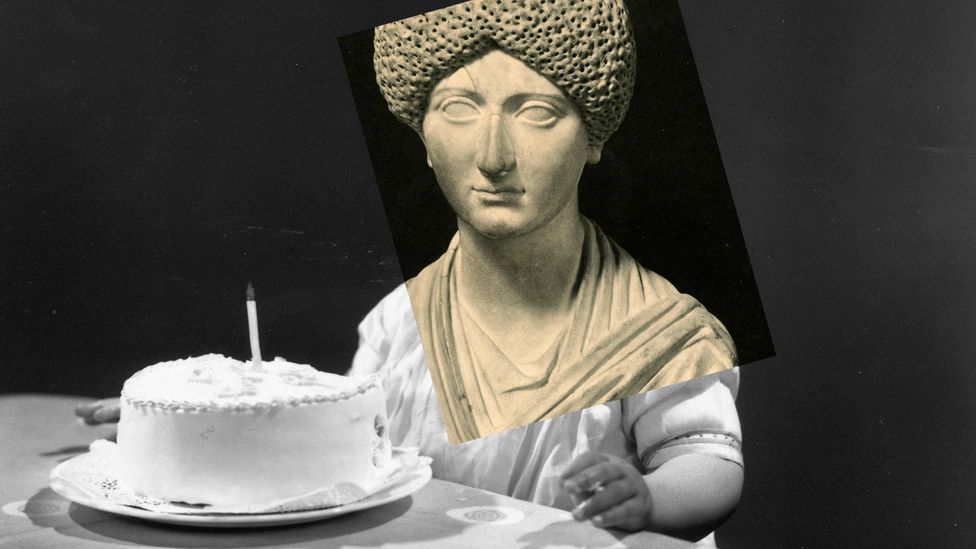
The Roman empress Domitia died in 130 at the age of 77 (Credit: BBC/Alamy)
Archaeologists Christine Cavern and Marc Oxenham of Australian National University have recently found the aforementioned. Looking at dental wear on the skeletons of Anglo-Saxons buried about 1,500 years ago, they found that of 174 skeletons, the majority belonged to people who were under 65 – but at that place also were sixteen people who died between 65 and 74 years old and 9 who reached at least 75 years of historic period.
Our maximum lifespan may not have changed much, if at all. But that'south non to delegitimise the boggling advances of the concluding few decades which take helped and so many more than people attain that maximum lifespan, and live healthier lives overall.
Mayhap that'south why, when asked what past era, if any, she'd prefer to live in, Oxford'due south Humphries doesn't hesitate.
"Definitely today," she says. "I think women's lives in the past were pretty nasty and brutish – if not and then short."
Amanda Ruggeri is BBC Time to come'southward senior editor. She can be found at @amanda_ruggeri on Twitter.
Join 900,000+ Future fans by liking us on Facebook , or follow us on Twitter or Instagram .
If you liked this story, sign upwards for the weekly bbc.com features newsletter , chosen "If Y'all Only Read six Things This Week". A handpicked selection of stories from BBC Future, Culture, Capital, and Travel, delivered to your inbox every Friday.
Source: https://www.bbc.com/future/article/20181002-how-long-did-ancient-people-live-life-span-versus-longevity
0 Response to "How Long Before You Know if You Have Food Poison"
Enviar um comentário